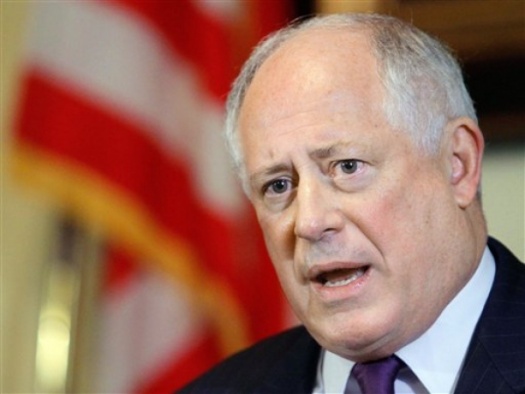
SPRINGFIELD, Ill. (AP) — Gov. Pat Quinn said Tuesday that an ethics law barred him from letting the public know seven weeks ago that he was dumping the director of the state’s child-welfare agency over allegations of fraud and mismanagement.
SPRINGFIELD, Ill. (AP) — Gov. Pat Quinn said Tuesday that an ethics law barred him from letting the public know seven weeks ago that he was dumping the director of the state’s child-welfare agency over allegations of fraud and mismanagement.
He said the law forced him to remain silent about the real reason for getting rid of Director Erwin McEwen until state inspectors finished their probe. McEwen’s departure was portrayed as a simple resignation, without any pressure from Quinn’s office, when it was announced in August.
Quinn also defended letting McEwen collect a salary for a month after announcing his resignation. The Democratic governor said that was done to ensure a smooth transition at the sensitive Department of Children and Family Services.
"He was head of an agency that deals with children and their safety that’s under federal court order, and I wanted to make sure there was a proper transition," the Democratic governor said at a news conference in Chicago.
Quinn’s explanation inspired skepticism from some.
Brian Gladstein, executive director of the Illinois Campaign for Political Reform, said Quinn and his staff were probably being "overly cautious" in their reading of the law. Releasing reports and documents on an investigation still in progress might be prohibited, he said, but the governor would be allowed to announce that an appointee was doing a bad job and was being replaced.
Rep. Jack Franks, D-Woodstock, was more blunt.
"The governor, certainly, as an executive is allowed to say, ‘I’m making a change’," said Franks, chairman of the House committee on state government administration. "By not doing that, we’re reinforcing business as usual by protecting insiders."
He also took issue with letting McEwen remain on the job for another month. "You don’t let it fester," Franks said.
Springfield attorney Carl Draper, who often handles cases involving discipline of state employees, said Quinn might be correct that he had to remain quiet if reports from state inspectors were the sole source of his knowledge about problems at DCFS.
The executive inspector general finished its investigation and released a report Monday accusing McEwen of turning a blind eye to problems involving a friend with more than $18 million in state contracts since 2008.
The friend, Chicago businessman George E. Smith, falsified documents, forged signatures, claimed improper expenses, collected pay for non-existent employees and more, inspectors concluded. They recommended the state seek criminal charges against Smith.
Smith’s conduct was made possible by an atmosphere of lax oversight by McEwen, who was first appointed to the job by former Gov. Rod Blagojevich, they said.
The law cited by Quinn’s office is part of the act setting up an ethics commission and detailing the duties of inspectors. It says "all investigatory files and reports of the Office of an Executive Inspector General … are confidential."
Copyright 2011 The Associated Press.
(AP Photo/Seth Perlman, File)
